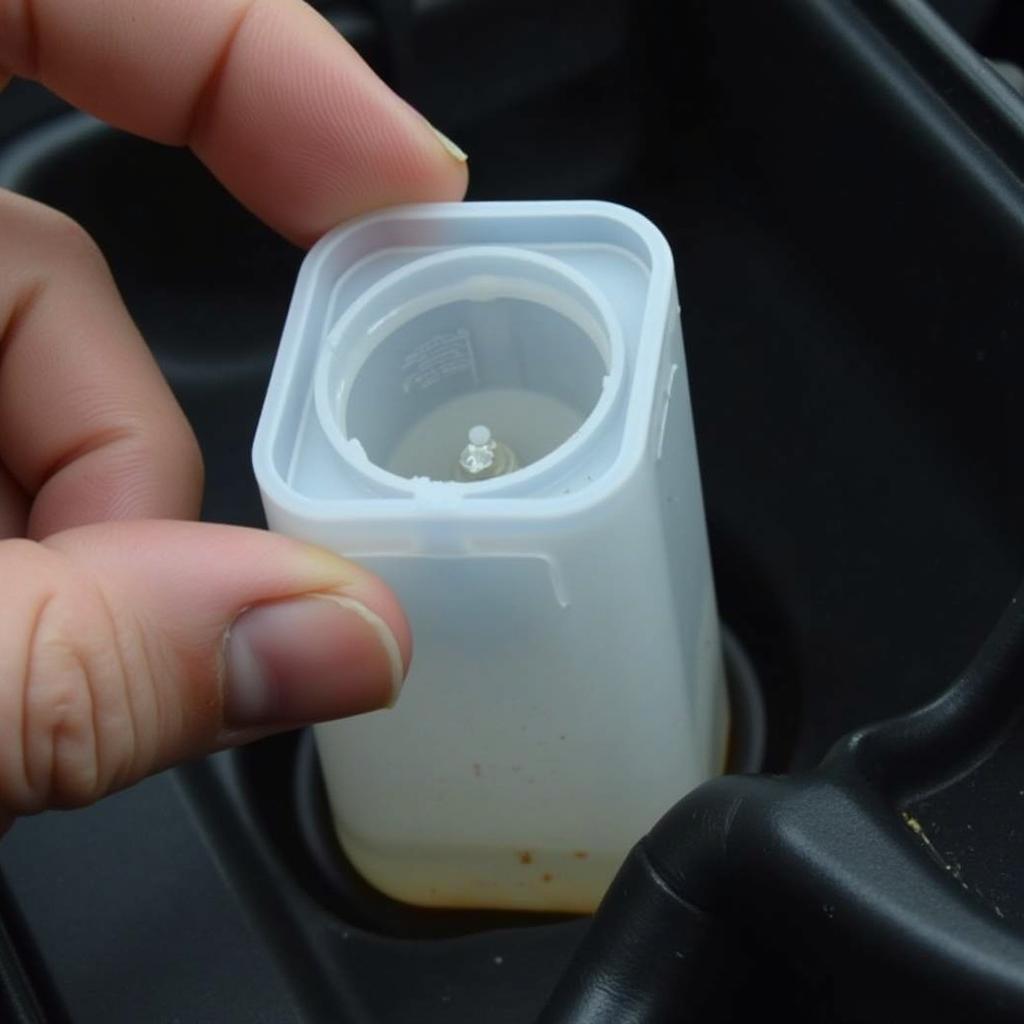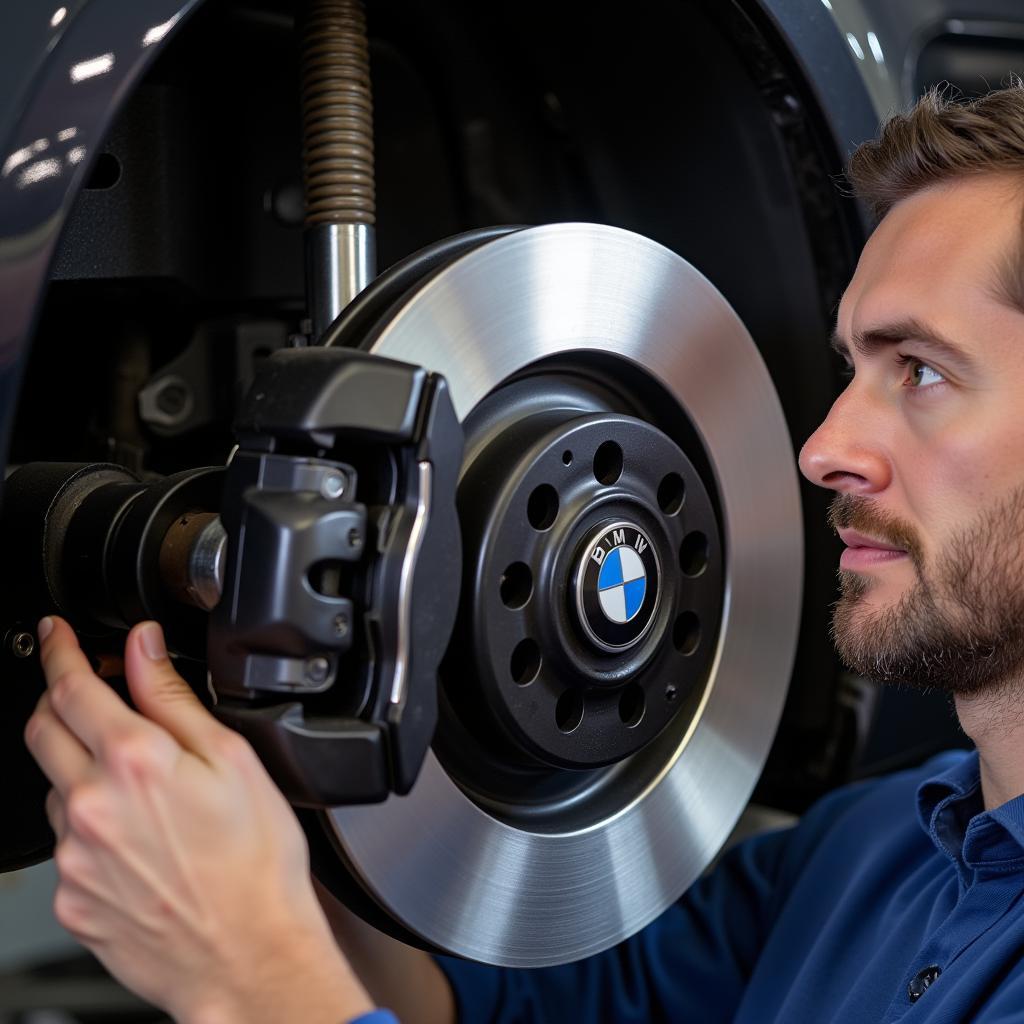The dreaded brake failure warning light on your BMW dashboard can send chills down your spine. It signals a potential issue with your braking system, demanding immediate attention. While it might seem like a nightmare scenario, understanding the causes and solutions can help you navigate this situation safely and effectively. This article delves into the common reasons behind the BMW brake failure warning light and provides practical guidance on resolving the issue.
Understanding Your BMW’s Braking System
Before we dive into the warning light, it’s helpful to grasp the basics of your BMW’s braking system. Modern BMWs utilize advanced braking systems with multiple components working together to ensure optimal stopping power and safety. Key components include:
- Hydraulic System: This system uses brake fluid to transmit force from the brake pedal to the brake calipers, activating the brakes.
- Electronic Parking Brake: Many newer BMWs feature electronic parking brakes, controlled by a button or switch instead of a traditional handbrake lever.
- Anti-lock Braking System (ABS): ABS prevents wheel lockup during hard braking, maintaining steering control and reducing stopping distances.
- Dynamic Stability Control (DSC): DSC enhances stability by individually braking wheels and managing engine power to prevent skidding and maintain control during challenging driving conditions.
Common Causes of the BMW Brake Failure Warning Light
The brake failure warning light can illuminate due to various reasons, ranging from minor issues to more serious concerns:
- Low Brake Fluid: This is one of the most common culprits. Brake fluid naturally depletes over time, and a leak in the system can lead to a significant drop in fluid level, triggering the warning light.
- Worn Brake Pads: Brake pads are designed to wear down over time. When they reach a certain thickness, the brake pad wear sensor will activate the warning light, indicating the need for replacement.
- Faulty Brake Pad Sensor: In some cases, the brake pad wear sensor itself might malfunction, illuminating the warning light even if the brake pads are in good condition.
- ABS/DSC Malfunction: Issues with the ABS or DSC system, often indicated by their respective warning lights on the dashboard, can also trigger the brake failure warning light.
- Brake Booster Problem: The brake booster assists in amplifying the force you apply to the brake pedal. A malfunctioning brake booster can reduce braking power and illuminate the warning light.
- Master Cylinder Failure: The master cylinder is a critical component that distributes brake fluid to the wheels. Failure of the master cylinder can result in a complete loss of braking power, making it an extremely serious issue.
What to Do When the Brake Failure Warning Light Turns On
If you see the brake failure warning light illuminated on your BMW’s dashboard, follow these steps:
-
Stay Calm and Assess the Situation: Don’t panic. Safely pull over to the side of the road as soon as possible. Avoid sudden braking or maneuvers that could jeopardize your safety or the safety of other drivers.
-
Check for Other Warning Lights: Observe your dashboard for any other illuminated warning lights, such as the ABS or DSC lights. These can provide additional clues about the specific issue.
-
Check Brake Fluid Level: If it’s safe to do so, carefully open the hood and locate the brake fluid reservoir. Check the fluid level, referring to your owner’s manual for the correct procedure and location.
 BMW Low Brake Fluid Level
BMW Low Brake Fluid Level
-
Avoid Driving Further: If you notice a low brake fluid level, worn brake pads, or any other potential issues, do not attempt to drive the vehicle further. Continuing to drive with compromised brakes can be incredibly dangerous.
-
Contact a Qualified Mechanic: It’s crucial to have your BMW inspected by a qualified mechanic, preferably one specializing in BMW vehicles, to diagnose and address the underlying cause of the warning light. They have the expertise, tools, and knowledge to accurately pinpoint the issue and perform the necessary repairs.
Remote Diagnostics and Software Solutions for BMW Brake Issues
In some instances, the brake failure warning light might be triggered by software glitches or sensor errors. Modern BMWs are heavily reliant on complex electronic systems.
-
Remote Diagnostics: Some specialized automotive service providers offer remote diagnostics for BMWs. This involves connecting your vehicle to a diagnostic tool, allowing technicians to remotely access your car’s computer system, read error codes, and analyze data in real-time. This can help in identifying the root cause of the warning light, especially if it’s related to software or sensor issues.
-
Software Updates and Programming: BMW frequently releases software updates to improve vehicle performance, address bugs, and optimize various systems, including the braking system. In some cases, a software update might be necessary to rectify a glitch triggering the brake failure warning light. Qualified BMW technicians or specialized service providers have the tools and expertise to perform these updates.
Expert Insight from Mark Stevenson, Senior BMW Technician:
“We’re seeing more software-related issues triggering warning lights in modern BMWs. While it’s always essential to check the basics like brake fluid and pad wear, don’t rule out the possibility of a software glitch. Remote diagnostics and software updates can often resolve these issues efficiently.”
Preventing Future Brake Problems in Your BMW
Taking proactive steps to maintain your BMW’s braking system can help prevent unexpected warning lights and ensure optimal braking performance:
-
Regular Brake Inspections: Adhere to BMW’s recommended maintenance schedule for brake inspections. This typically involves checking brake pad thickness, rotor condition, brake fluid level and quality, and inspecting other braking system components.
-
Timely Brake Fluid Flushes: Brake fluid is hygroscopic, meaning it absorbs moisture over time. This can compromise braking performance and potentially damage braking system components. BMW recommends flushing the brake fluid at specific intervals, usually every 2 years or as per the maintenance schedule.
-
Quality Brake Pads and Rotors: When it’s time to replace your brake pads and rotors, opt for high-quality parts that meet BMW’s specifications. Using substandard components can lead to premature wear, reduced braking performance, and potential safety hazards.
 BMW Brake Inspection and Maintenance
BMW Brake Inspection and Maintenance
BMW Brake Failure Warning Light: FAQs
Q: Can I drive my BMW with the brake failure warning light on?
A: It’s strongly advised against driving with the brake failure warning light illuminated. Doing so puts you and others at risk. Safely pull over and contact a qualified mechanic.
Q: How much does it cost to fix a BMW brake failure warning light issue?
A: The cost can vary greatly depending on the underlying cause. Simple fixes like low brake fluid or worn brake pad replacements are less expensive than complex repairs involving the ABS, DSC, or other major components.
Q: How often should I check my BMW’s brake fluid level?
A: It’s a good practice to visually inspect your brake fluid level at least once a month. Additionally, refer to your BMW’s owner’s manual for recommended brake fluid flush intervals.
Q: Can I add any brake fluid to my BMW?
A: It’s crucial to use only the brake fluid type and specification recommended by BMW for your specific model. Using incorrect brake fluid can damage your braking system.
Q: How can I find a qualified BMW mechanic near me?
A: You can use online resources, BMW forums, or ask for recommendations from fellow BMW owners to find reputable BMW specialists in your area.
Conclusion
Addressing the BMW brake failure warning light promptly is paramount for your safety and the longevity of your vehicle. By understanding the common causes, knowing how to respond, and prioritizing preventative maintenance, you can confidently navigate this situation and keep your BMW performing at its best. Remember, when it comes to brakes, it’s always better to err on the side of caution and seek professional assistance.
